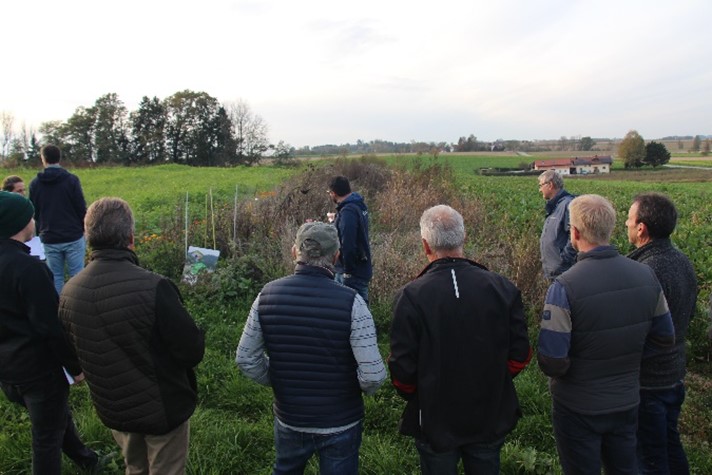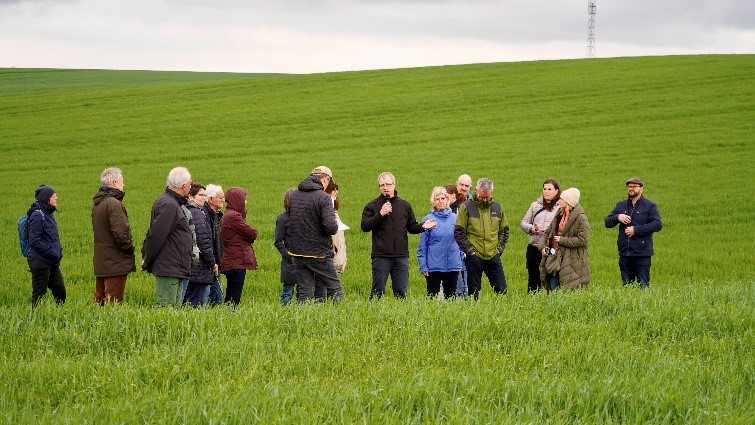Koks iššūkis/problema buvo sprendžiama?
Intensive agriculture is regarded as a main cause of the decline of insect diversity and biomass in Germany. Todėl, Within the frame of the national action programme for the conservation of insects, the project “Promote Insects in Agricultural Landscapes” (FInAL) is aimed at demonstrating how diversity, biomass and functionality of insects can be enhanced in agricultural landscapes, especially through integration of renewable resources and implementation of methods of integrated pest management so as to facilitate promotion of insects in a landscape laboratory with the participation of numerous agricultural enterprises and researchers. FInAL also aims at improving resource availability for insects, close resource gaps within the year, and connect currently isolated habitats (overwintering- , reproductive-, food – sites) by diversification of the agricultural land and improvement of habitat connectivity.The project team consists of three landscape laboratories in representative agricultural landscapes in Germany, where FinAL will develop, demonstrate and evaluate innovative measures for facilitating insects through integrated cultivation of renewable resources in a landscape context; approximately 30 farm managers from each of the three regional landscape in Germany,30 researchers from different disciplines and the Bavarian State Institute for Agriculture (LfL) in Ruhstorf an der Rott as a partner to the project.
Kaip išsprendei problemą?
In the process of addressing this challenge, the FInAL have therefore established three Landscape Laboratories in representative of agricultural landscapes of Germany i.e in Lower Saxony, Brandenburg and in Rott Valley, where innovative measures are developed, demonstrated and evaluated for facilitating insects through integrated cultivation of renewable resources in a landscape context.
These Landscape Laboratories, t.y. the landscape sections where measures for facilitating insects have been established, were investigated with respect to their initial state, land-use options, and effects of the measures on different features, primarily in relation to incidence and functionality (pvz. in integrated plant protection) of various groups of insects. In these three places, farmers and scientists work closely together to find answers to the question of how insect-friendly management can succeed. In these agricultural regions which covers approximately 900 hectares are being scientifically accompanied by comprehensive insect monitoring. A designated group of farmers provides data on classic management according to good professional practice in a neighbouring area(reference landscape). The results from the landscape laboratories are summarised and analysed in an integrative manner with regard to the effectiveness of the measures, acceptance in practice, transferability to other landscapes and possible funding policy recommendations.
Kas naujoviška jūsų praktiniu atveju?
For the FinAL project to carry on,it was necessary to establish landscape laboratories according to agricultural landscapes in Germany. landscape laboratory refers to a section of an agricultural landscape in which innovative measures are carried out to promote insects in cultivation systems taking into account integrated cultivation of renewable raw materials in a landscape context. Landscape Laboratories aims to promote insect diversity and biomass through the cultivation of renewable resources and through usage of alternative cultivation systems in which renewable resources are cultivated in parallel and mixed with other crops in crop rotations. Todėl, a landscape laboratory should record all agricultural land as well as the unused parts. Alongside Landscape Laboratories, FInAL established test sites for conducting field experiments in which innovative cultivation methods are investigated, t.y. to identify impacts on insects under deliberately induced changes and transformations. Example for these include cultivation of cup plant.
Kokie yra sėkmės veiksniai sprendžiant problemą?
The co-design: For the model and demonstrative FInAL-project the so-called BACI-design (Before-After-Control-Impact) is well suited. Within the BACI-design at least two landscapes with similar environmental conditions and agricultural structure are chosen and a baseline monitoring is conducted to generate a robust and reliable depiction of the current state of the response variable (Before = status-quo).
If both landscapes show similar variation in their response variable, specific measures (Poveikis) can be implemented within one of the landscapes. A monitoring program is conducted in both landscapes with the same sampling strategies. Šiuo būdu, the reference landscape (= Control, business as usual) allows the assessment of environmentally based fluctuation of the response variable and the impact-landscape (in this case the Landscape Laboratory) reflects change caused by implemented measures (in addition to environmental change). A robust baseline and parallel monitoring of a reference landscape is key for the interpretation of such data.
Working together with farmers which built trust between the project actors and farmers in developing new measures together.
Flexibility of the developed measures to both actors including farmers; farmers are able to give out their ideas during the project.
Netikėtos nesėkmės, jei bet kuris
The beaurocracy made the implimentation process slower than expected.
Establishing enough laboratories to all farmers is not easy.
Išmoktos pamokos
There is greater and deep understanding of the insects:as you are involved in the series of discussions and workshops between project actors,you learn more about insects as members share their knowledge on the insects and more research is done too so as to bring everything together on the table.
It is important that the advisors involved in the project posses high skills in coordination and handling group of farmers,mobilising and bringing farmers together as well as being able to be a polite person with patient .
The advisor should also have a direct contact with farmers,be able to organise and carry out seminars and workshops to disseminate the measures and new ideas as a result ofthe project and advising the way forward to the actors concerning the project.
It was important for the whole team of actors to work together and interact freely with one another as this is an intensive project which constitute intensive interaction.
Kokį vaidmenį praktikoje atlieka patarėjas ar patarėjų tarnyba
- Having direct contact with farmers
- Carrying out project coodination and disseminating important project information.
Ar jūsų požiūris gali būti perkeltas ir (arba) pritaikytas kitiems inovacijų iššūkiams ir regionams?
Taip.
Už dalijimąsi patirtimi apie gerą praktiką, please contact Veronika Fick-Haas and Sebastian Wolfrum (paštu: Veronika.Fick-Haas@lfl.bayern.de Telefono Nr: +49 8161 8640-4654; Pablo Asensio: Pablo.Asensio@fueak.bayern.de)


